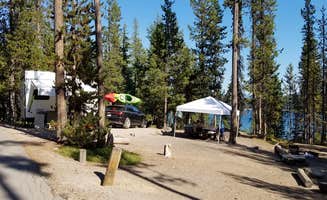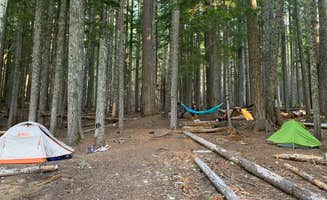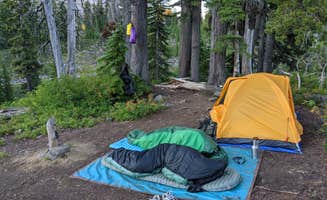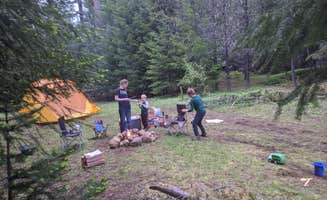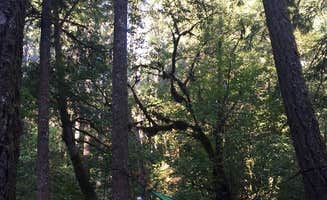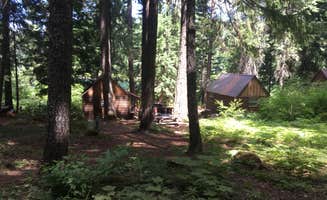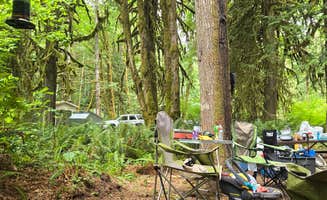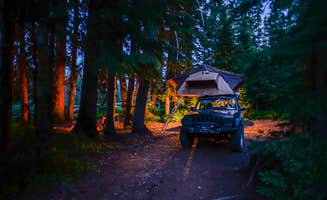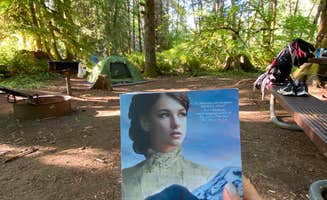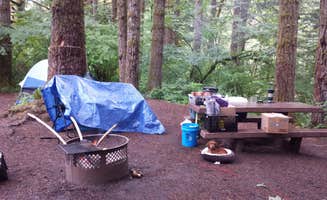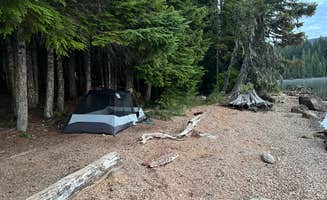Tent camping near Detroit, Oregon offers access to serene forest landscapes at elevations between 1,500-5,000 feet in the western Cascades. The area receives heavy winter snowfall with summer daytime temperatures typically ranging from 70-85°F. Several campgrounds provide opportunities for stargazing due to minimal light pollution, though higher elevation sites can experience temperature drops of 20-30 degrees after sunset.
What to do
Fishing at fish hatcheries: Marion Forks Campground provides unique fishing education opportunities. "The camp site is just behind a fish hatchery which is pretty cool to check out with the kids," notes Brian C. The hatchery offers glimpses of various life stages of fish: "My boys and now my granddaughter love going to the fish hatchery and seeing the baby fish and the HUGE fish," shares Patty R.
Summit mountain peaks: From Pamelia Lake, hikers can attempt Grizzly Peak for spectacular views. "We summited Grizzly Peak and saw beautiful views of Mount Jefferson," reports Audrey M. The hike requires moderate fitness but rewards with panoramic vistas of multiple Cascade mountains.
Gold panning: Quartzville Recreation Corridor offers recreational mining opportunities along its designated Wild and Scenic River. "A little bit of luck head to the stream and find some gold," suggests Cindy U. Bring basic panning equipment and check current regulations before prospecting.
What campers like
Secluded forest camping: Marion Forks Campground offers a quieter alternative to busier sites. "I love this campground because it's tucked away off of the highway and doesn't have a lot of people," writes Kris O. The unique site layout provides added privacy: "Each spot has--and I'm not sure why this is--a split rail fence around it," notes Corinna B.
Alpine lakes for swimming: Elk Lake Campground provides refreshing swimming opportunities during summer months. "The lake is actually pretty warm in August - warm enough for swimming (and I don't ever swim in Oregon water)," mentions Stephanie Z. The lake's accessibility makes it ideal for cooling off after hiking.
Short backpacking experiences: For those new to overnight hiking, Tumble Lake offers an accessible introduction. "The hike itself is very short, and you can make a stop to Dome Rock on your way before heading down to the lake either before camping or after," explains Sonja O. The relatively flat terrain makes it manageable for beginners carrying overnight gear.
What you should know
Limited facilities at most sites: Most primitive camping areas have minimal amenities. At Rainbow Campground, "No water available, so make sure you bring your own, and there is only one double sided vault toilet for the campground," explains Katherine H.
Permits and reservations: Some destinations require advance planning. "Permits are awarded via lottery," for Pamelia Lake according to Audrey M., who adds "We were lucky enough to snag a permit the week before and we were very glad we did since we were asked to show proof of our permit twice during the 4 days we were staying there."
Road conditions: Accessing remote campgrounds often requires navigating rough roads. For Britenbush River Dispersed and other dispersed camping areas, high-clearance vehicles may be necessary during spring runoff periods when forest roads can develop deep ruts.
Seasonal pests: "Mosquitos are abundant June-July" at Pamelia Lake according to Mandy E. Similarly, Bennett F. warns about Marion Forks: "In June or July, the mosquitoes will eat you alive if they get the chance, so don't give it to them. Bring lots of bug repellent."
Tips for camping with families
Hatchery tours: The Marion Forks fish hatchery provides educational opportunities for children. "This can be a fun site for kids and sometimes the staff will give you a tour," mentions Kelly N. The self-guided interpretive signs make it accessible even without a formal tour.
Swimming holes: Detroit Ranger District offers family-friendly water access. "I kayaked into a channel and found the silence I was looking for," notes Sarah W., highlighting the possibility of finding quieter spots even on busy weekends.
Berry picking: Late summer visitors can combine camping with foraging. "If you do the Battle Axe Hike in the late summer, study up on your edible berries before you come, there are so many huckleberries here I could have filled a bucket," suggests Stephanie Z. about the Elk Lake area.
Butterfly watching: Specific times of year offer unique wildlife viewing. "During this time of year there are swarms of butterflies," notes Kate S. about Marion Forks Campground, providing a natural science opportunity for curious young campers.
Tips from RVers
Size limitations: Most of the best tent camping near Detroit, Oregon isn't suitable for larger RVs. At Rainbow Campground, Tony P. notes their site "was extremely accommodating to our pop-up trailer, SUV, and one additional vehicle."
Limited facilities: Most campgrounds lack hookups or dump stations. At Santiam State Forest Rock Creek Campsites, Marie C. explains "the walk-up sites are $15 a night and the drive-up sites are $20 a night" but indicates only basic facilities: "there is 3 garbage cans and a porta potty."
Navigation challenges: Narrow forest roads can be challenging for larger vehicles. "Windy narrow road a couple state campgrounds and day use areas... limited places to turn around," warns Len S. about Quartzville Recreation Corridor, adding it's "well worth the adventure!"


